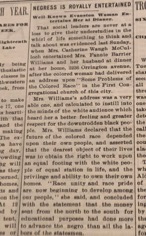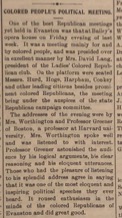My name is Molly Sampson, I am a current graduate student at Loyola University Chicago studying public history and library science. This summer I had opportunity to work at the Evanston History Center as the Vickie Burke Intern for Women’s History. As the centennial of the ratification of the19th amendment approaches, my research and the research of past interns will culminate to form a digital and physical exhibit displayed at the Evanston History Center.
One of my main goals for the summer was to research the suffrage activities of black women in Evanston. Chicago and the surrounding cities are known as a center for the suffrage movement and Illinois was one of the first states to grant women the right to vote. However, the black community has historically been excluded from the narrative of the suffrage movement. Racism and indifference to the work of African American women to secure the vote were key factors that led to the absence of black women in discussions of the movement. Over the summer I found that the black community in Evanston was not only well organized, but also engaged in many social, philanthropic, and political matters.

In the late 19th and early 20th centuries, black women could not solely focus on the right to vote. Lynching was a national crisis. Unequal job and education opportunities needed to be addressed. Discrimination, red-lining, and Jim Crow laws all threatened the black community. Black leaders, including Ida B. Wells, recognized the need to actively support suffrage, but also focus on more pressing matters.
Black women in Evanston created many different clubs to address political matters. The black auxiliary of the Woman’s Christian Temperance Union, the Julia Gaston Club, and the Iroquois League all engaged in philanthropic and political activities within the city. In some cases, the black women’s clubs were more active than the white women. The Ladies Colored Republican Club was mentioned in the Evanston Index in 1896, more than 20 years before the (white) Women’s Republican Club was founded in Evanston.

Limited documentation and newspaper coverage make it difficult to pinpoint the exact activities of the black women’s clubs in Evanston at the time. It is also difficult to identify many of the women involved in clubs because of there are often variant name spellings across newspapers, or the women are listed under their husband’s name and not their own. But through my research I have found that many women involved in Evanston clubs were also involved in Chicago suffrage clubs. Additionally, the work of other Republican clubs across the state suggests that the black women’s Republican clubs engaged in suffrage activities.
In the coming weeks, I plan on writing more thoroughly on the activities and importance of black women’s clubs in Evanston as well as places where interracial cooperation happened during the suffrage movement. You’ll find that post on the Evanston Women Fight for the Vote online exhibit. Stay tuned for more!
